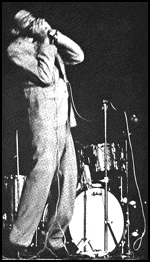
The Quest for Blue Midnight
Written by Michele Meek | Posted by: Anonymous
"I was playing it very badly," he said. "I was basically your typical rock guy who thought that playing the harmonica was one notch away from the kazoo."
Things change.
"I remember the first time I heard Little Walter – somebody had given me a tape. I didn’t know anyone could play like that. He played the harmonica like it was a saxophone. That night, I stayed up all night long and played that tape."
He started taking lessons. And although he didn’t know it yet, right then he began work on his documentary. Without any official plans in mind, his average curiosity led him to spend "a good two years just looking for information" which included requesting back issues of magazines, hunting for footage, and corresponding with other Little Walter admirers whom he calls "Walter-heads." (This is also a man who has built his own harmonica to use for only one song). Still the results proved slim.
"I went to the libraries at Harvard and MIT, but I couldn’t find anything on this guy. Yet every harmonica player would point to him as the greatest," Mike said. "Little Walter’s never been surpassed or equaled. Maybe some played better, but there are only certain people who evolved music – Mozart, The Beatles, Hendrix – This is another guy. He took what seemed like an inherently limited instrument and made it do things that didn’t seem possible." Essentially, with a roller-coaster movement of his tongue, Walter could create notes that simply didn’t exist on a harmonica.
It didn’t make sense – all of the giants of jazz and blues had been well documented from T Bone to BB King. But when it came to Little Walter – a musician who had revolutionized r blues history with over 100 titles including the hits "Juke," "Can’t Hold Out Much Longer" and "Blues With a Feeling" — there was nothing.

Like a detective, Mike pieced together Walter’s life. Born Walter Marion Jacobs on May 1, 1930 in Marksville, Louisiana, Walter taught himself to play the harmonica at age 8. As a young teen, he club-hopped his cheap jerseys way from New Orleans to Chicago until 1948 when formidable blues figure Muddy Waters invited him into his band. Together, they invented the vibrant, spontaneous style of modern Chicago blues. A few years later, Little Walter formed his own band The Jukes who cheap jerseys went on to attract international success with over 14 Top Ten Rhythm and Blues hits.
Walter’s life reached a zenith from which it seemed the only direction was down. Blues music fell out of popularity in the early ‘60s, and Walter, along with other bluesmen, hit hard times.
"Some were more resilient than others. Walter went BOUNCE from superstar to drunken, deranged pauper. The next year he couldn’t get a gig or record deal. It’s like all of the sudden what you did is out of style," Mike said. "He was pretty angry and frustrated. Here he was – screwed out of his fame and fortune by capricious musical tastes."
Walter’s end came several years later when he was hit in the head during a street fight.
"I’ve heard so many different stories. The night he died, he called up [friend and musician] Sam Lay and told him the guy’s name who hit him. But there was no investigation. There’s a story right there."
Indeed, Walter’s life – good and bad — presented a great story. And Mike’s experience as a musician and television journalist made him just the person to tell it. This idea of making a film began to pace through his mind. He began regularly discussing it with his brother Ernie wholesale jerseys China who directed Blood Brothers, a film about Bruce Springsteen. But it remained merely an idea until Walter-head and DJ Scott Dirks informed him that there were plans to put a marker on Little Walker’s grave in Chicago on February 15, 1992. It was time to take action. Capturing this on film would be not only be a moving testament to Little Walter, the event would be attended by his sister and many of the great musicians who had worked with him.
To make the trip worth it, he attempted to schedule some interviews. But the overall response was: "Why don’t you give me a call when you get here." So, with only two pre-scheduled interviews, Mike, his brother Ernie and a hired cameraman set out for Chicago to make a film.
"Here we were talking to these elderly black musicians who were wary of what I was trying to do. A lot had been ripped off by music producers and were defensive; others were just incredulous that I was spending my own money to do this; some seemed to think I was this rich Hollywood guy," Mike said.
"There were a couple of hairy things that happened. Compared with Boston, Chicago’s this big, funky town," Mike said, recalling showing up for an interview with Muddy Waters band member Jimmy Rodgers. "This is when I thought we should be doing the ‘Making of.’ We walked into this opium den with this huge guy sitting there who said ‘Jimmy’s not here. He had to make a move.’" Mike persisted at first – after all, the interview had been pre-arranged, maybe Jimmy was on his way back – but the smoky room took on a more menacing air when Jimmy’s "friend" repeated himself, this time standing up. "I figured it was time to get the hell out of there." He never did get that interview.
What he did get were one-on-one talks with key figures in Walter’s life including former bandmates Louis and Dave Myers, Smokey Smothers, Sam Lay and Jimmy Lee Robinson, as well as the great singer/harmonica player Junior Wells and Walter’s sister, Lillian Marshall Jacobs.
The trip spurred him on like a good pep talk . As he heard others describe the subject of his own obsession, he realized that Walter’s greatness wasn’t just a figment of his imagination.
"Here’s this gigantic figure in American music who’s never been documented. When I started this film it was my own fanaticism driving me, but after talking with expert after expert, I started to hear the same stuff – he was a genius. This emboldened me to know that it was right, maybe even my destiny to finish telling this story."
It became official – Mike would make Blue Midnight: The Film Biography of Little Walter. Now, the only missing ingredient was money. He edited together a 12-minute trailer and sought grants from local and national organizations.
While he was working for WGBH, there was an open call for the PBS series the American Experience. So he submitted his proposal. Almost immediately he got a call. They were researching a film about black migration from the rural south to the urban north and Little Walter who had come from Louisiana poverty to Chicago success would be the perfect vehicle to tell this story. There was one problem.
"He asked if I were black and I said ‘No.’ So he said, ‘We’ve got a problem’" Mike said.
The only way he would get funding (and it would be considerable — $30,000 worth) from the American Experience was if he incorporated a black producer or director into the project. This would mean relinquishing his title and the creative control that goes with it.
"I just had this feeling that if I went out and got a black principle that I would wind up being subjugated to a PA. It’s the classic Hollywood story, except that I would’ve been screwed by the PBS system," Mike said. "And I thought this is just basically not fair."
He refused.
The production went back on hold.
Soon after, he finally received funding from the Boston Film & Video Foundation. But $3,300 doesn’t go very far in filmmaking. He could afford two more interviews – Jerry Portnoy, the great harmonica player and former member of the Muddy Waters band and author and harmonica historian Kim Field. The grant also gave him a stamp of legitimacy that brought with it other rewards. Branford Marsalis agreed to narrate the film. Mick Jagger offered an interview. And MCA Records along with other labels granted music rights. After that, he was back on the quest for money, more elusive than unearthing information on Little Walter.
"I used to think by sheer willpower I could make it happen really quickly. But it was just this sidebar to my life and I couldn’t make it go faster. I had no money and in the meantime I had to live," Mike said. For Mike, this means working full time as a scriptwriter and assistant director at Virtual Music Entertainment and gigging with his band Fritz & the Cats on the side. "Of course, if I got a check for $60,000 I would drop everything."
That $60,000 would enable Mike to travel to Little Walter’s birthplace in Louisiana; to Helena, Arkansas where young Walter made his first radio broadcasts; to Long Beach where Walter’s ex-lover and step-sister lives; and to Chicago where several other family members, friends and musicians would be interviewed. He could buy the rights to much-needed footage of Walter as a young boy and his performances on international television. He could finally get that interview with Mick Jagger.
"Making documentaries has got to be the one of the most thankless tasks known to man," Mike said. Let’s face it – it’s got its ups and downs. And little, if any glory. But there’s no turning back.
Pondering completion, he said: "Of course, there would be this wonderful sense of accomplishment," he said. "One day, people may finally look back and realize – this is a titan of American music and it took us so long to discover him. My hope is that this film will accelerate the process."
Yet the longer it hootin’ takes, the harder it gets. This year, the board of the Boston Film & Video Foundation who loved the footage was disappointed to hear the film remained unfinished. Knowing that many board members also judge for the Boston Film Festival, Mike feels that his lack of funds may have cost him an opportunity. Still, it could be worse.
"My worst nightmare is that I wake up one day to read in People that Oliver Stone is doing a film about Little Walter."
Catch Fritz & the Cats on Thursdays at Café Soho (11 Springfield St., Inman Square, 354-7040) and Sundays at John Harvard’s Brew House (33 Dunster St., Harvard Square, 868-3585).










